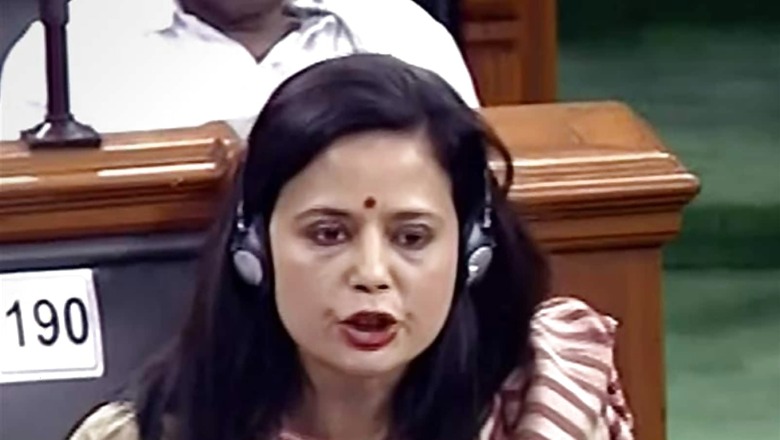
views
Recently, a controversy has broken out over the poster of a film portraying Hindu Goddess Kali as a smoker and LGBTQ rights activist. This film was scheduled to be screened at a Canadian government-backed film festival but the protests by members of Hindu community led the Indian government to register its concerns diplomatically due to which the screening was shelved and an apology was also duly issued. Such imagery aside, fuel to fire was added by Trinamool Congress parliamentarian and spokesperson Mahua Moitra, who said that the controversy is needless because for her Kali is a “meat-eating, alcohol-accepting” goddess. This has generated another round of debate, but her party immediately distanced itself from her remark with Moitra finding solidarity from Shashi Tharoor, a Congress MP instead. While the merits of the controversy are being hotly debated with ‘Freedom of Speech’ absolutists admonishing ban seekers for imitating the Islamists, the larger point that is being missed is the misappropriation of Kali by the West for its own goals.
This is not the first time that Kali, a Hindu goddess, has been portrayed in a demeaning fashion. In 2008, Hollywood actor Heidi Klum earned the wrath of millions of Hindus worldwide when she dressed as Kali for a Halloween party. In 2012, an American brewery faced backlash after it named its latest alcoholic drink in the name of Kali. While there is commercial appropriation of Kali to generate brand value by celebrities and brands, the misappropriation by Kali by West, especially the feminists, is something that the latest controversy has highlighted.
Often Instagram pages of feminist collectives share images of Kali with sexual overtones where she is smoking, drinking or engaging in a behaviour that is befitting for an “empowered woman”.
Portrayal of Kali as a Western-style feminist icon is deeply problematic. Western feminism is reactionary in character. The first wave of feminism took place in the 19th and early 20th centuries where women sought to overturn the legal inequalities against them with respect to voting rights in particular. Second wave of feminism focused on cultural inequalities, gender roles and norms and status of women in the society as it unfolded between the 1960s and the 1980s. Third Wave from 1990s onwards focused on reproductive rights and globalisation of feminist discourse. Most importantly, it started talking about intersectionality where empowerment of all women including their overlapping identities in terms of race, ethnicity, class, religion and sexual orientation is advocated.
What’s common to all the waves of feminism, including intersectional feminism, which is the current buzzword is empowerment of women by breaking the rules. Western feminism works on the underlying assumption that it’s a men’s world where women have to claim their space and rights and to do that, breaking the current rules and generating shock value is most important. Intersectional feminism is where feminism meets LGBTQ activists with both relying on outrageous conduct and discourse to attract attention for their cause. It is here that they have appropriated Kali.
The imagery of Kali as a smoking woman with a LGBTQ poster was aimed at generating shock value. But this was a very unfair and brute imposition of Western feminism on Indians, especially Hindu women. Intersectional feminism advocate’s empowerment for all but this portrayal of Kali is doing more disservice than any benefit.
In the Hindu scheme of universe, Kali is not a rule breaker. She is a creator and destroyer, a rule maker herself to whom the three gods — Brahma the creator, Vishnu the conductor, and Shiva the destroyer — themselves pray. You can’t empower Kali. She is the one who is empowering the three main gods of Hindu beliefs. By portraying Kali as a rebel and a rule breaker in a men’s world, Westerners are underestimating and undermining her actual potential as the creator of the universe itself which goes against the principle feminist cause of empowering women.
Unlike Western feminism, Indic feminism is more empowering as it recognises the role of women as a creator. Not just Kali, there are multiple other goddesses which determine the rules in their own respective domains with total authority and control — such as Saraswati in the domain of knowledge and Laxmi for wealth. This is very different from the Western context where women have to be a rule-breaker, a protestor and a shock-value generator to be effectively heard. Hence, the portrayal of Kali in multiple posters across Instagram as a rule-breaking woman ends up misappropriating Kali from the original context.
This is even more unfair looking at the history of India as a wounded civilisation. It was colonised for 200 years and its culture was misinterpreted by a colonial power to effectively subjugate the natives. Such demeaning portrayal of Kali time and again reignites these wounds and needs strong Indian voices to counter them.
The author is a PhD in International Relations from the Department of International Relations, South Asian University. Views expressed in this article are those of the author and do not represent the stand of this publication.
Read all the Latest News, Breaking News, watch Top Videos and Live TV here.




















Comments
0 comment